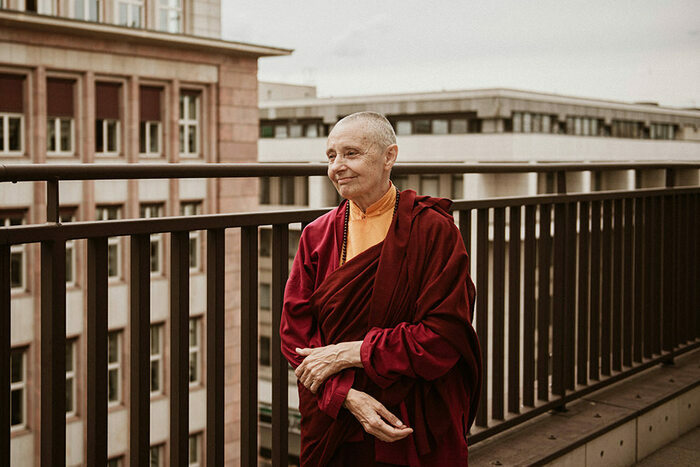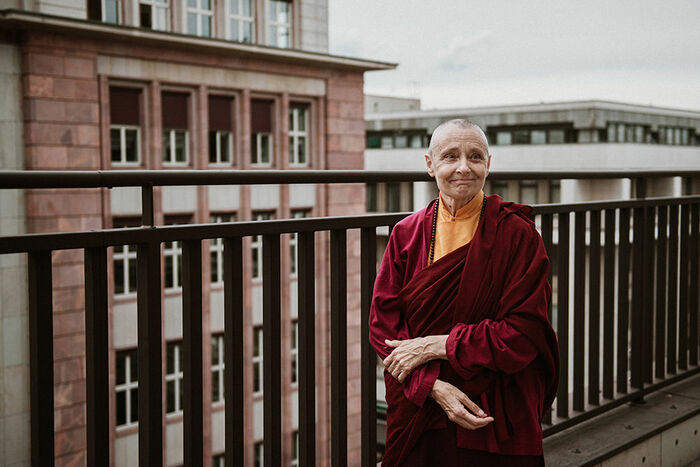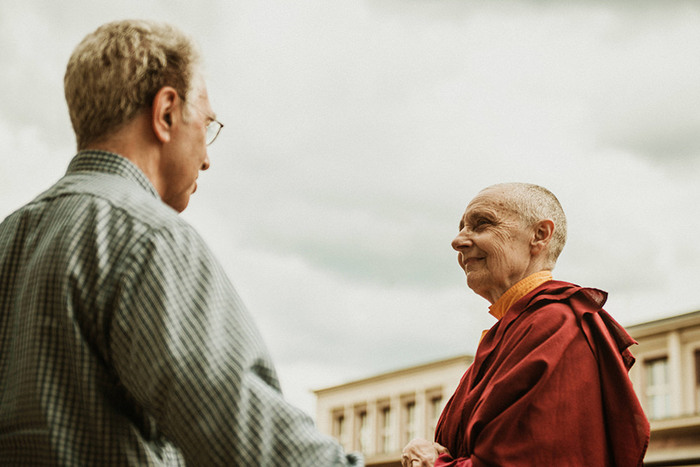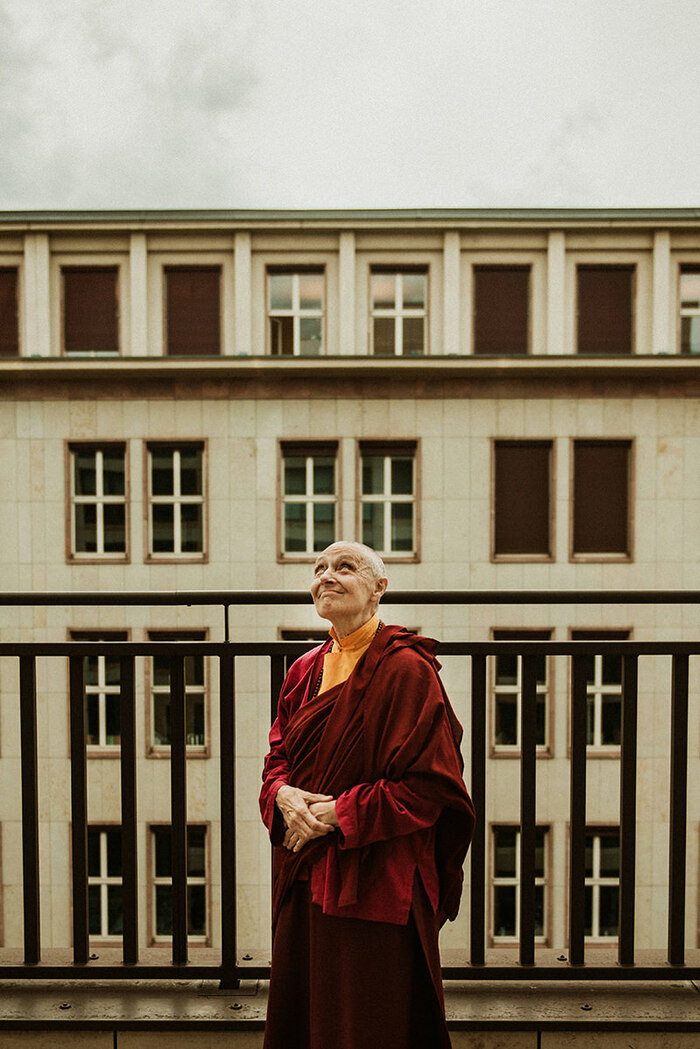
We’re at the Mindspace office located in Friedrichstrasse, in the centre of Berlin, and everything is not alright. The team is rushing around trying to find a suitable room to hold an interview. And it’s an interview with not just anybody — but with the esteemed teacher, Jetsunma Tenzin Palmo. Can we find somewhere large enough or quiet enough? Then, suddenly, the audio recording equipment seems to fail on us. In the midst of this chaos, she arrives. And somehow, everything falls into place. The room we get is way too small for the five of us to fit inside, and yet in her presence, everything seems to expand. It’s not the quietest place either, but listening to her speak, all distractions fall away.
Jetsunma Tenzin Palmo is one of the world’s foremost Western Buddhist teachers. In 1967, at the age of 21, she received ordination at Rumtek Monastery in Sikkim from the 16th Karmapa, becoming one of the first Western monastics. She went on to complete twelve years of intense meditative practices, with three years of strict solitary retreat in a cave in the snowy mountains of Lahaul, northern India. Her root teacher Khamtrul Rinpoche requested her to establish a nunnery, and with the blessings of His Holiness the Dalai Lama, she founded Dongyu Gatsal Ling in India. She now travels the world teaching, advocating for equal rights and opportunities for Buddhist nuns and raising funds for her nunnery.
Study Buddhism: You were one of the first Western women to be ordained as a Buddhist nun, at a time when Buddhism was barely known in the West, and there were no Dharma centers and hardly any teachers traveling around. You grew up in London, so how did you come in contact with Buddhism and how do you explain the conviction you felt at such a young age?
Tenzin Palmo: Since I was a small child, I’d believed we were inherently perfect, and that we had to keep coming back again and again until we recognized our innate perfection. The question was, of course, what exactly is perfection, and how do we achieve it?
When I was 18 I read a book and came across the Dharma. I was halfway through the book when I turned to my mother and said, “I’m a Buddhist,” to which she replied, “Oh are you dear? Well, finish the book and then you can tell me about it.” I realized I’d always been Buddhist, but I just hadn’t known it existed, because in those days not even the word “Buddha” was ever spoken. This was in the 1960s, so there wasn’t that much available, even in London.
I subsequently realized I was more inclined toward the Tibetan tradition, and when I was 20, I went to India. On my 21st birthday, I met my lama, Khamtrul Rinpoche, and three weeks later I took my first ordination as a nun and went to work with him.
He then told me to go to Lahaul in northern India, where I stayed for the next 18 years. I never really wondered about going from London to Lahaul. It all seemed such a natural progression. In London I felt I was in the wrong place and wanted to leave. I’d thought about going to Australia or New Zealand. It’s nothing against England, but I knew I wasn’t meant to be there. But once I came to the Dharma, I recognized that the place I needed to go was where the teachers were.
Later, I’ve returned to India, after being asked to start a nunnery, and have since spent my time there and touring around the world giving talks on the Dharma.
Your root teacher Khamtrul Rinpoche was your first teacher and you had a very committed and close relationship with him. How did you choose Khamtrul Rinpoche, and what is your advice to those seeking a teacher?
In India many people come to discuss things with me. Half of them come saying, “I have a problem, I want to find a teacher.” The other half say, “I have a problem because I have a teacher!” So it’s not so simple.
There are many wonderfully qualified teachers out there, but that doesn’t mean that each teacher is suitable to the same person, anymore than people fall in love with the same person. We all have our own karma and so different teachers will be meaningful to different students.
There are also certain teachers who shouldn’t be teachers. But the main thing here is that we shouldn’t be too naive or taken in by charisma. Just because someone is very charismatic, it doesn’t mean that they’re genuinely qualified.
In the texts, and as His Holiness the Dalai Lama reminds us, we should check the person’s behavior not when they're sitting on a big throne, but behind the scenes. How do they treat ordinary people – not the big sponsors – but just ordinary people who are of no particular importance to them. I asked my own lama what he thought of a particularly controversial lama whom he knew very well, and he said that it was difficult to say, and that we could check in 20 years to see what his students turned out like. I’d say look at the teacher’s students. Do you want to be like them? If you see a good and harmonious sangha, and if they’re practicing well and are good people with good hearts, then you have a cause for trust.
As for myself, I knew Khamtrul Rinpoche was my lama as soon as I heard his name, so I completely contravened my own advice here! Nonetheless, he was a Buddha and so that was very fortunate.

When you started out, you had to travel to India in order to receive teachings. But in this day and age, we can access teachings on the Internet and even practice guided meditation online through various YouTube channels. Can these alone be of benefit or are face-to-face teachings essential?
The Internet can be enormously helpful, just as books can, but I don’t think it’s the be-all and end-all for really practicing Buddhism. At a certain point, as with learning any skill, we need personal instruction from someone who is more advanced than us.
If we want to be musicians, dancers or sportspeople, we can download a certain amount and watch DVDs and read books, but in the end we need someone to assess us and give us personal instruction. The two go together. We don’t always need to be sitting at the foot of the teacher, but from time to time we need someone who can overview us and give us direction.
Many people become interested in Buddhist practice via mindfulness, which you often say is an integral part of Buddhist life. What does mindfulness mean for you and how does it support us in our Dharma practice?
Nowadays, mindfulness has become a catch-all word, but the general principle of trying to be more conscious and aware in our daily life is very important. Along with this, it’s helpful to contemplate some of the mind training verses which are designed to take and transform all of the problems we experience.
All of the external circumstances and the rude and difficult people we meet, instead of getting angry, upset, or frustrated, we see that we can take them all and use them on the path in a way that actually invigorates and strengthens us, rather than defeats us. It’s all very practical advice, and that’s why I talk a lot about how to make our daily life into Dharma practice, otherwise it’s easy to feel hopeless and helpless.
Whether we’re in retreat or out in the world, we should try to develop the quality of awareness as much as possible. Distraction is the main problem for us all – what the Buddha called the “monkey mind.” We need to tame this monkey mind. Wherever we are and whatever we’re doing, we’re either conscious, or we’re not. Either we’re aware and present, or we’re not. There is no half way.
One of the best pieces of advice I’ve ever received was from the yogis at our monastery, who advised to observe the mind three times every hour. We make the commitment to stop for a moment and look at what the mind is doing, what mind state we are dwelling in. We don’t judge it; we just know it. Gradually we’ll become more and more accustomed to being conscious of what we’re thinking and what our various positive and negative states are. We’ll become more and more the masters of our mind, rather than the slaves.

You mentioned just now about feeling hopeless and helpless, and I think sometimes we can feel like this even if we are mature practitioners. How can we nurture ourselves when we feel stuck in our Dharma practice, lacking enthusiasm, or when we feel like we have run out of fuel?
First of all, it’s important to lighten up a bit! I’ve often said that the seventh paramita should be a sense of humor, so we don’t take ourselves too seriously. We need to be sincere in our practice, but at the same time we can’t take ourselves too seriously.
Here, I think it’s crucial to recognize that we are so fortunate to have this human birth where we can practice what we want, pick up and not just read books but actually understand them. This level of education is very rare throughout history, so we shouldn’t take it for granted. We should develop a deep appreciation for all that we have and not waste it, otherwise we’ll die with deep regrets.
The whole time, we’re dealing with the mind and how to tame it, and how to transcend our ordinary conventional mind. This takes an enormous amount of determination and perseverance. It also requires an attitude of being relaxed and spacious, rather than tense and stressed. It’s certainly not a matter of lying back and expecting it all to happen. If we don’t make it happen, it won’t!
Also, I think it’s a bit like with technology, you have to recharge your batteries. Doing retreats, getting personal teachings from time to time from inspiring teachers, all of this helps to recharge our batteries. Then we get inspired and can carry what we’ve gained into our daily life, which is very important.
Finally, the Buddha always emphasized the importance of good friends. We live in a society that is heading in one direction, so it’s good to have at least a few friends who share the same values and can encourage us and help us to remember that we’re not alone or peculiar, but that what we’re doing is a very valid way of life. This will encourage us to put the Dharma at the center of our life, and not the periphery, and to use our daily life as our Dharma practice.
You are known around the world as a pioneer for women in Buddhism. First off, you made a vow to attain enlightenment in the female form! On top of that, you established the Dongyu Gatsal Ling nunnery in India and have been advocating for equality for nuns. How do you view the current roles and opportunities of women in Buddhism?
Traditionally, women didn’t have much of a role in Buddhism. The books were all written by monks, for other monks. So the general view of the feminine was rather misogynistic, with women playing the role of the forbidden other, waiting to pounce on innocent little monks! In that society, it was hard for women to become educated and get the deeper teachings and really become accomplished.
Nowadays, this has all changed a lot. Girls go to school along with the boys and are becoming highly educated. This year there will be the first crop of geshema, doctors of divinity, with their certificates from His Holiness the Dalai Lama. The nuns more than anyone are really coming on, doing profound spiritual practices and staying in long-term retreats, and in every way recognizing their potential.
It has to be said that the main supporters in this have been the monks, once they got the idea that nuns could also study. They became the teachers and were very enthusiastic in encouraging the nuns. What they have been in opposition to is the idea of full ordination for nuns, which has had an interesting wall of resistance for the last 30 years.
In this respect, right now we’re looking toward His Holiness the Karmapa, who said that it will be done. So we have to wait and see how he plans to do it, because everyone will be watching. It’s important that it’s done right and he finds a way in which everyone can agree that it’s a valid ordination, because then it opens the door for everyone.
It’s great to hear about the progress nuns are making. You’ve said that you believe nuns will have an increasingly important role to play in upholding the Dharma. What are the main obstacles they face?
If you go to any nunnery and ask them what the main obstacle is, they’ll always say low self-esteem and lack of confidence. It will take time. But the difference between the first girls from Ladakh who became nuns to the girls we have now is very encouraging.
I asked the first group of nuns we had if they believed that males were inherently more intelligent than females, and they all said yes. I said, “No, it’s just that they’ve had more opportunity. When you have equal opportunity, you both do well. Some males are intelligent, some are dumb. Some females are intelligent, some are dumb. We’re all human beings, no one is superior.” Now, if I were to ask the same question, the girls would be puzzled by the question itself! So, it’s coming along.
The new nuns don’t know that they’re “supposed” to be meek and submissive, and so in many ways they believe they can do anything, because they’ve seen the earlier ones do it. In this way, there’s nothing for them to doubt.

Lots of us in the West also struggle with low self-esteem, anxiety, and depression. It’s been said that Western countries are facing a “loneliness epidemic.” How can Buddhism help us with these feelings?
Perhaps one of the main antidotes to depression, lack of self-esteem, loneliness and so forth is the recognition that we really do have Buddha-nature. All the other problems like anger, jealousy, ambitions, are merely habitual patterns that we’ve learned, but aren’t inherent to who we are. We’re not lowly sinners, we’re not worthless beings. We are something jewel-like and beautiful.
We’re always given the message that our potential is so limited, which is so sad. Actually, our potential is infinite. The nature of the mind is completely incredible. This is incredibly helpful because, even if one isn’t a committed Buddhist, it just helps us become better human beings. I know many Catholic priests and nuns who use the Buddhist teachings to become better Catholics, and Jews who use them to become better Jews. Why not?! It just takes us toward more deeply recognizing our original nature, which is what we all share after all.
Meditation is a way to take us to a deeper level of awareness. We’re normally caught up in the current of our thinking, feelings and emotions. With awareness, we can observe it all without being swept away. This gives us access to something much vaster and deeper than our usual compressed minds.
Buddhism helps us to overcome our endless ego grasping mind to open up to something so much more spacious and genuinely meaningful. All of us can access this. It’s not so difficult. With some instruction and practice, anybody can do it.
Thank you very much, Jetsunma Tenzin Palmo, for your time and sharing such precious wisdom!